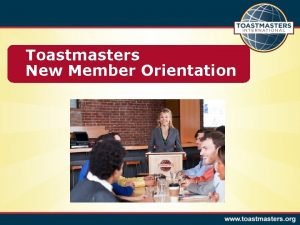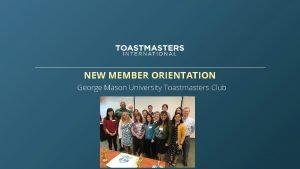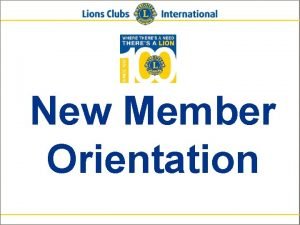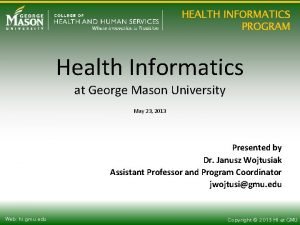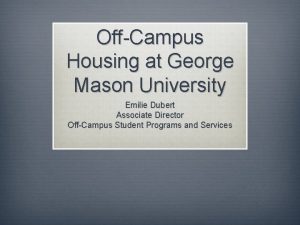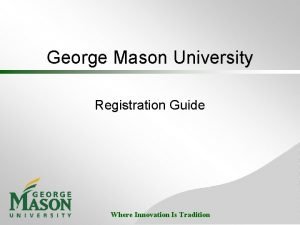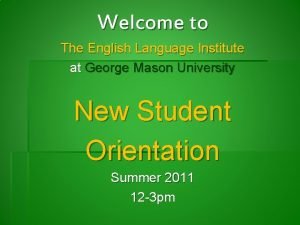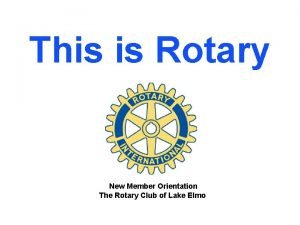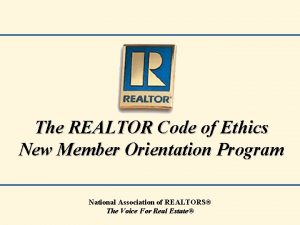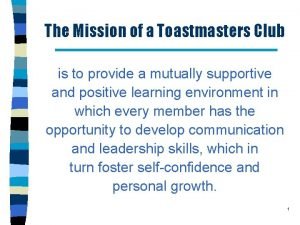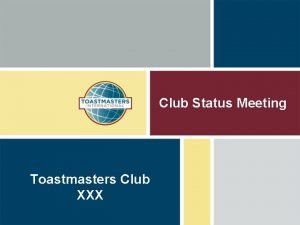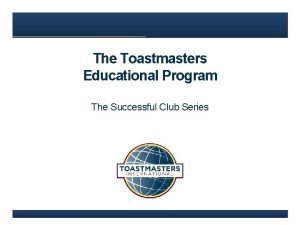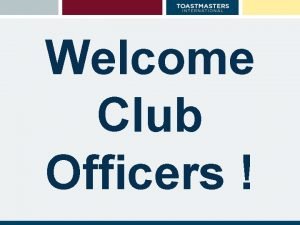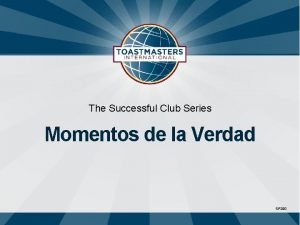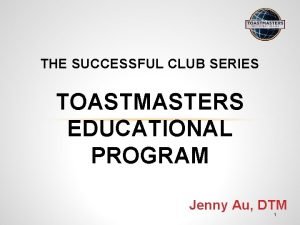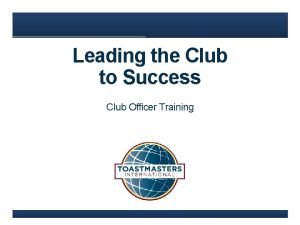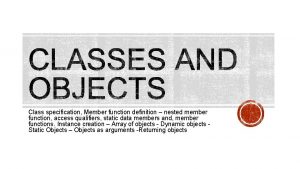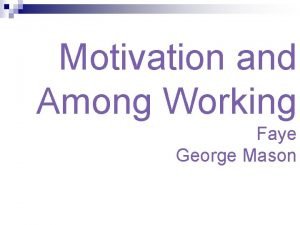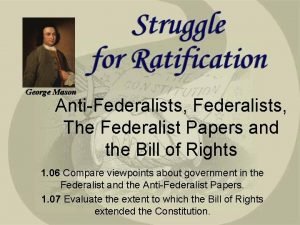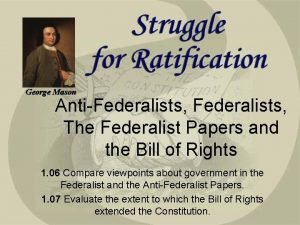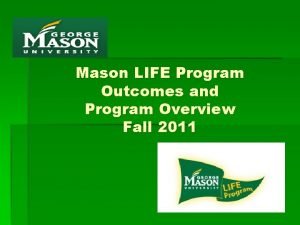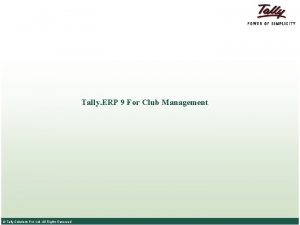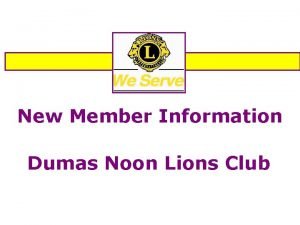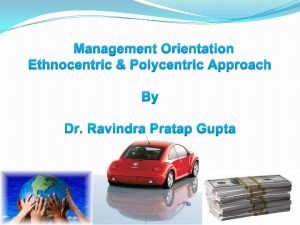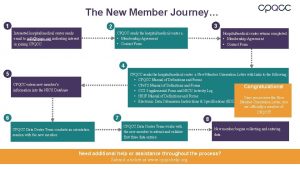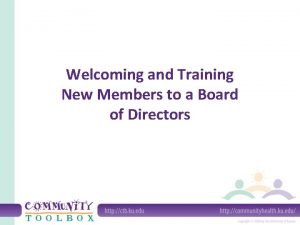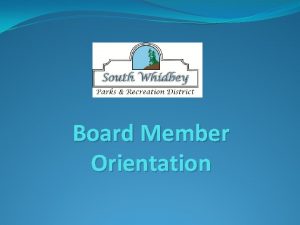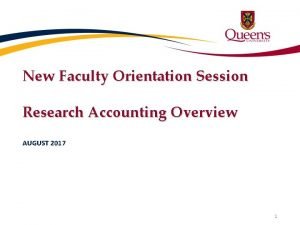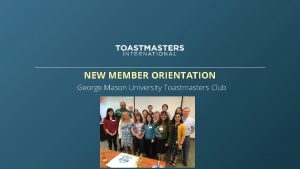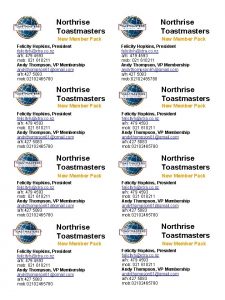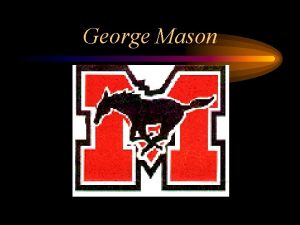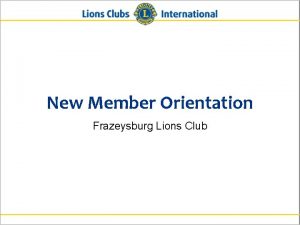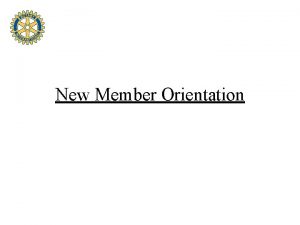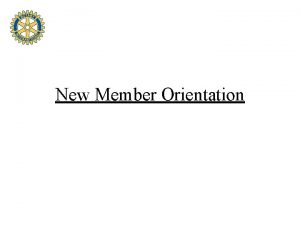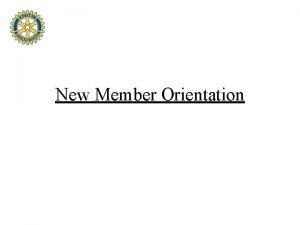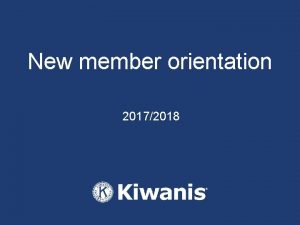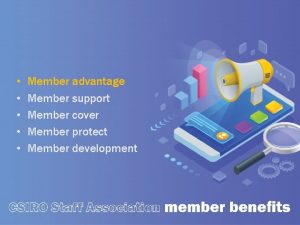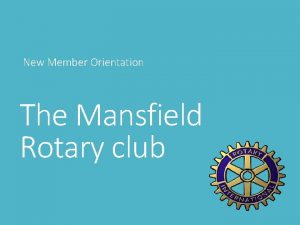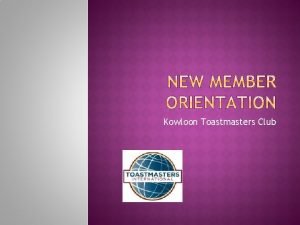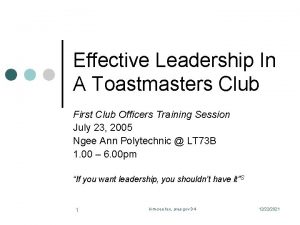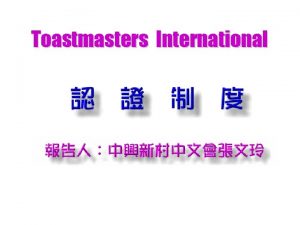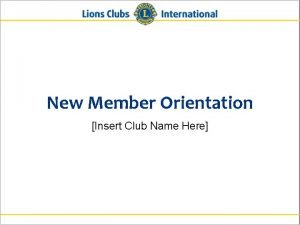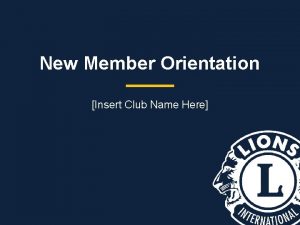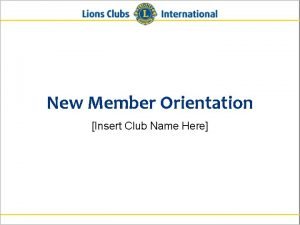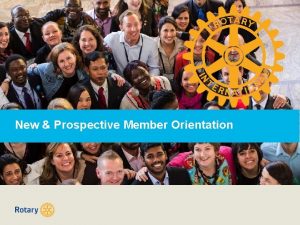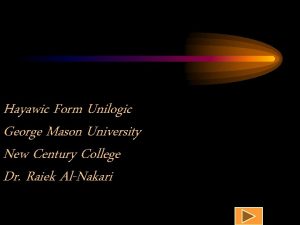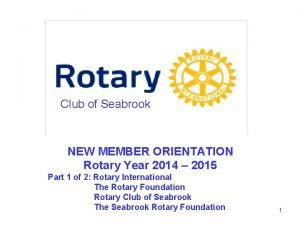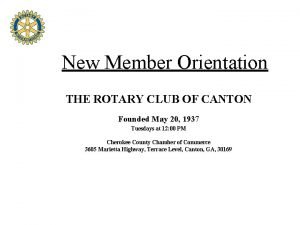NEW MEMBER ORIENTATION George Mason University Toastmasters Club

NEW MEMBER ORIENTATION George Mason University Toastmasters Club

Welcome! We are glad you have joined our supportive community focused on personal and professional development. This new member orientation program is intended to be portable, and accessible online from anywhere. It is broken into the following five modules that have been incorporated into this slide presentation. Use the arrows to jump to sections: Introduction to Toastmasters GMUT Club Culture Club Meeting Roles Evaluations Greeting a Guest The program is intended to be done with your mentor helping to guide you through each section, answering questions along the way, and giving you examples from their personal experiences. Feel free to work through the modules at your own pace … it is not meant to be done all at one sitting, but rather used as reference while you move through each stage. We hope this new member orientation program enhances your Toastmasters Journey, and we look forward to your participation in our club!


https: //www. toastmasters. org/about/all-about-toastmasters Toastmasters International Mission We empower individuals to become more effective communicators and leaders. Club Mission We provide a supportive and positive learning experience in which members are empowered to develop communication and leadership skills, resulting in greater self-confidence and personal growth. Toastmasters International Core Values • Integrity • Respect • Service • Excellence

A Toastmaster’s Promise As a member of Toastmasters International and my club, I promise (click to continue) • To attend club meetings regularly • To prepare all of my projects to the best of my ability, basing them on the Toastmasters education program • To prepare for and fulfill meeting assignments • To provide fellow members with helpful, constructive evaluations • To help the club maintain the positive, friendly environment necessary for all members to learn and grow • To serve my club as an officer when called upon to do so • To treat my fellow club members and our guests with respect and courtesy • To bring guests to club meetings so they can see the benefits Toastmasters membership offers • To adhere to the guidelines and rules for all Toastmasters education and recognition programs • To act within Toastmasters’ core values of integrity, respect, service and excellence during the conduct of all Toastmasters activities.

First Steps ▸ Log into your Toastmasters account: https: //www. toastmasters. org/login Enroll in Pathways: https: //www. toastmasters. org/Pathways-Overview Pathways is an education program that guides you through selection and preparation for a specific professional development topic area, such as communications, leadership, coaching or collaboration. ▸ You may want to complete an assessment to help you determine your “pathway. ” The program will keep you focused on upcoming projects and guide you through every step along the way to achieving your goals. ▸ Download the Navigator, a guide filled with essential information about the Toastmasters journey. Use it to help you begin your journey and support your progress.

Mentors Shortly after joining GMU Toastmasters, you will be paired with a mentor. A mentor can be someone you already know from the club or a new acquaintance. Your mentor will share knowledge about the club culture and guide you through early steps you can take to get started participating in the meetings. At first, you may feel more comfortable attending a few meetings to learn how they run. BUT, don’t be afraid of taking on easier roles or participating in table topics. You will get more out of every meeting by actively participating, even if you’re not ready to deliver your first speech. ▪ Some members have been in toastmasters for quite some time, and you can learn from their experiences, and this will help foster a culture of mentorship.

How your mentor will help you … Encouragement Helping you build confidence Staying on track to meet Toastmaster goals Explaining club culture and roles Practicing speeches in advance Meeting to discuss speech outlines or ideas Talking to you about club leadership https: //www. toastmasters. org/Resources/Mentoring

Ice Breaker Speech If you’ve attended a few meetings, you have probably heard an ice breaker speech. This 4 -6 -minute speech is how you introduce yourself to your club and learn the basics of preparing and delivering a speech. Pathways will guide you through preparing, practicing and delivering your first speech. It includes pre- and post-speech assessments to gauge your feelings about the experience that will help you identify areas for improvement – and areas where you felt confident! TOASTMASTER PATHWAYS – Ice Breaker After you have completed your ice breaker, don’t forget to make a record of your speech in Pathways so that you receive credit for the speech, and can start preparing for your next speech.

GMUT Club Culture https: //toastmasters. gmu. edu/

There are six basic levels in the organizational structure of Toastmasters International. *Area and District Governors are now called Directors!

George Mason University Toastmasters is Club #1188374, and is part of Area 21, Division B, District 29 Toastmasters Region VII. Get to know District 29!

Club Communication ▸ The GMUT listserv to receive regular club e-mail distributions: GMUTOASTMASTERS-L@listserv. gmu. edu ▸ GMUT Dropbox Account ▪ ▪ ▪ Dropbox is a cloud service the club uses to provide members with a variety of shared files and folders along with the meeting role schedule template. You will receive an e-mail invite to access to the Excel file: GMUT Schedule Template. xlsx and other member files/resources The GMUT Schedule Template is where you will sign up for speeches and meeting roles. The Toastmaster of the Day (TMOD) uses this information to create the weekly meeting agendas.

Your Club Experience https: //www. toastmasters. org/membership/club-experience ▪ Positive: For many of you, this is your first time practicing public speaking, and we strive to create an environment that fosters professional growth and comradery. ▪ Encouragement: Constructive feedback comes from a place of wanting to see others improve, and should be helpful, challenging, and motivating. ▪ Etiquette: ▪ Use professional etiquette. Show up to meetings on time. If you have to leave early do not be disruptive. ▪ Be quiet and respectful when other people are talking. ▪ Silence cell phones during meetings and do not be on devices while people are speaking. ▪ For meetings to run smoothly, please listen to the instructions of the Toastmaster of the Day. ▪ Everyone takes a turn at each meeting role!

Club Contests Speech contests are a Toastmasters tradition. Each year, thousands of Toastmasters compete in the Humorous, Evaluation, Tall Tales, Table Topics and International speech contests. Competition begins with club contests and winners continue competing through the area, division, district and region quarterfinal winners advance to the International competition, where they will compete in the semifinals for a chance to take part in the World Championship of Public Speaking®. https: //www. toastmasters. org/leadership-central/speech-contests

CLUB MEETING ROLES https: //www. toastmasters. org/membership/club-meeting-roles

Roles Explained Grammarian and Ah-Counter The Grammarian and Ah-Counter roles are combined in our club, and notes any overused words or filler sounds along with helping members improve their grammar and vocabulary. Timer Taking on this role improves time management skills. Meeting Speaker Every speaker is a role model and club members learn from one another's speeches. Toastmaster (TMOD) The Toastmaster is a meeting's director and host.

More Roles … Table Topics Master Taking on this role improves organization skills, time management and facilitation skills. Table Topics Speaker Table Topics helps members develop their impromptu speaking skills. Evaluators provide verbal and written feedback to meeting speakers. General Evaluator The General Evaluator evaluates everything that takes place during the club meeting.

Navigating Meeting Roles ▸ What’s a good role to start with? Timer, grammarian, thought of the day and participate in table topics ▸ Ready to advance to another level? Speech evaluator and Table Topics Master See Evaluations section of this presentation ▸ Feeling comfortable? Challenge yourself with these roles General evaluator or TMOD ▸ All role descriptions and responsibilities can be found in your Dropbox account in Resources for all GMUT Members >Quick Guides for all Roles

Tips for Toastmaster of the Day (TMOD) Go to GMU Shared files in Dropbox and select the folder called “Resources for TMOD”. There you will find TMOD checklists for before, during and after the meeting. There is also a copy of the club roster with email addresses for all members. The agenda template is also in Dropbox. Reach out to the speakers signed up in the schedule template and confirm their speech titles and times. If a member is giving a speech that’s longer than 5 -7 minutes, you will only have time for two speeches. Ask speakers if they will be using AV. The first message should go out no later than the Monday before the meeting with a draft agenda. You can also indicate roles that are needed in that first message.

Club Leadership Club officers provide leadership and support to foster a positive environment that’s conducive to members’ personal and professional growth, allowing them to achieve their Toastmasters education program goals. https: //www. toastmasters. org/leadership-central/club-officer-tools/club-officer-roles CURRENT GMUT CLUB OFFICERS https: //toastmasters. gmu. edu/club-officers/

The Distinguished Club Program (DCP) An annual program, running from July 1 through June 30. To help keep track of your progress toward these goals throughout the year, updated reports are posted daily on the Toastmasters International website at http: //dashboards. toastmasters. org/ Based on the goals met and whether or not the qualifying membership[ requirement has been met, the club may be recognized as a Distinguished, Select Distinguished or President’s Distinguished Club. 10 goals grouped in the following areas: Education: Members who have the opportunity to earn education awards are reaching their goals. Membership: When new members join, everyone’s experience is enhanced because your club has enough members to provide leadership and fill meeting and committee assignments. Training: Trained club officers are better able to serve and support your club because they know how best to fulfill their roles. Administration: Fulfilling administrative duties, including submitting information on time, helps your club run more smoothly, which benefits members.

Evaluations https: //www. toastmasters. org/membership/club-meeting-roles/evaluator

Evaluation is the heart of the Toastmasters educational program. You observe the speeches and leadership roles of your fellow club members and offer evaluations of their efforts, and they do the same for you. As evaluator you: ▸ Ask those you've been assigned to evaluate what they will present and what they wish to achieve. ▸ Provide objective verbal and written evaluations for speakers. ▸ When giving any evaluation, offer praise as well as constructive criticism. To learn more … Enhancing Evaluations

Giving and Receiving Feedback ▸ Evaluations show you what you do well and what you might consider practicing. ▸ It's through honest, fair evaluations that you truly learn and grow. Every speech you deliver will be evaluated by another Toastmaster, and you will eventually be asked to evaluate others' speeches, which will help you to develop even more. ▸ You have likely already witnessed the benefits of evaluations in your club. A member speaks, receives verbal and written feedback from another Toastmaster and then uses those comments to improve the next speech. The evaluator's goal is to give the speaker constructive feedback that will help them improve. ▸ You will be assigned an evaluator once you have scheduled your first speech. Send this person the evaluation resource for your project assignment or ensure they can access it in advance of the club meeting. This way, the evaluator can get familiar with what they need to look and listen for during your presentation. Find your evaluation resource toward the end of your project or search for it on Base Camp.

Evaluation Resources You can access and download fillable PDFs of all Pathways evaluation resources from the Toastmasters resource library, here. You can also download them from the Tutorials and Resources section of Base Camp or from the Speech Evaluations page. “Effective Speech Evaluations”, is a word document in Dropbox, Resources for all GMUT members Serving as General Evaluator: https: //www. toastmasters. org/membership/club-meeting-roles/general-evaluator

Greeting a Guest https: //www. toastmasters. org/membership/how-to-join

Coming Full Circle … Now it’s your turn to greet a guest! GMU Toastmasters club strives to create a warm and friendly environment, and guests are welcome to attend any of our meetings. Before the meeting starts, introduce yourself to a guest and sit with him/her during the meeting. You can explain that the sergeant-at-arms will ask each guest to introduce themselves and explain what brought them to the meeting. Ask the guest to register in our guestbook so we can keep them updated with our club events or announcements. Answer any questions about the meeting segments and encourage him/her to participate in Table Topics. After the meeting, introduce the guest to the VP of Membership or any of the officers and help answer any questions about the meeting or how to become a member of Toastmasters.

Congratulations! ▸ Completing a path is a significant accomplishment, but your journey doesn’t have to end. Pathways offers 10 distinct paths to help you broaden your communication and leadership skills. You can complete additional paths to build and develop different skills that you use in your personal and professional life. https: //www. toastmasters. org/education/pathways ▸ The highest educational designation you can earn as a member is the Distinguished Toastmaster (DTM) award, given to those who complete two paths, serve in specific volunteer leadership roles and complete the “Distinguished Toastmaster” project. The DTM recognizes a superior level of achievement in both communication and leadership.

Acknowledgements … This program was designed and developed as part of a High Performance Leadership Project by Heather Aleknavage in April 2020. Her action strategy team included the following Toastmasters: Erika Marquina Sarah Roth Philip Wilkerson Aisha Yusuf Please contact Heather at haleknav@gmu. edu if you have any questions or comments about the program.
- Slides: 30
